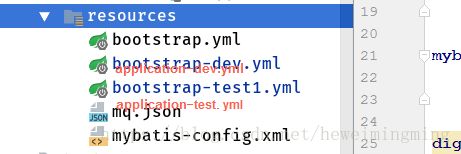springboot启动环境变量profile maven打包profile内部原理
springboot启动处理步骤:
1、不接配置中心的情况下,启动的时候springboot默认会加载bootstrap.yml 以及 bootstrap- profile。 p r o f i l e 。 {profile}在bootstrap.yml中 spring.profiles.active: dev 指定。
另外说一下,加载顺序如下: bootstrap.yml 》 bootstrap-dev.yml 》 application.yml 》
application-dev.yml
也就是说先加载bootstrap开头的再去加载application开头的;同为bootstrap开头的bootstrap.yml比bootstrap-dev.yml先加载,同为application开头的同理。
如果这4个配置文件中存在相同的属性,那么后加载的属性值会覆盖掉前加载的属性值。
测试代码如下:
@Slf4j
@Configuration
public class TestConfig {
@Value("${test.p}")
private String testProfile;
@Bean
public String test(){
System.out.println("test.p="+testProfile);
log.info("test.p="+testProfile);
return "";
}
}
bootstrap-dev.yml:
test.p: devbootstrap-test1.yml:
test.p: test在idea中指定启动参数 spring.profiles.active=dev,相当于在java -jar -Dspring.profiles.active=dev
![]()
启动应用打印:
![]()
把启动参数改为test1,启动打印:

以上的操作证明了springboot在启动的时候只会加载指定的profile对应的bootstrap-profile文件,而不会加载未指定的profile文件。
2、有时候我们不希望在启动的时候才指定profile,例如不想在生产环境指定这个启动参数,那么这个时候我们可以在mvn构建的时候就做处理。处理的步骤是这样的:
①、父pom文件建立多个profile

<profiles>
<profile>
<id>sitid>
<properties>
<profiles.active>devprofiles.active>
properties>
profile>
<profile>
<id>productionid>
<properties>
<profiles.active>testprofiles.active>
properties>
profile>
profiles>②、多个子项目情况下,子pom文件使用maven逻辑指定过滤的properties文件,读取properties文件下的内容:
properties内容如下:
spring.profiles.active=test
spring.cloud.config.uri=xxx这里会读取到这两个变量,spring.profiles.active和spring.cloud.config.uri
子项目pom文件如下设置:
<build>
<finalName>${project.artifactId}finalName>
<plugins>
<plugin>
<groupId>org.apache.maven.pluginsgroupId>
<artifactId>maven-compiler-pluginartifactId>
<configuration>
<source>1.8source>
<target>1.8target>
configuration>
plugin>
<plugin>
<groupId>org.springframework.bootgroupId>
<artifactId>spring-boot-maven-pluginartifactId>
<version>${spring.boot.version}version>
<executions>
<execution>
<goals>
<goal>repackagegoal>
goals>
execution>
executions>
plugin>
plugins>
<filters>
<filter>src/main/profiles/profile-${profiles.active}.propertiesfilter>
filters>
<resources>
<resource>
<filtering>truefiltering>
<directory>src/main/resourcesdirectory>
resource>
resources>
build>其中profiles.active在maven打包的时候-P指定
读取到的配置spring.profiles.active和spring.cloud.config.uri会替换掉bootstrap.properties文件中的变量:
bootstrap.properties内容如下:
spring.application.name=jd-xx
spring.profiles.active=${spring.profiles.active}
spring.cloud.config.uri=${spring.cloud.config.uri}
spring.cloud.config.enabled=true这里打包出来的结果是:
spring.application.name=jd-xx
spring.profiles.active=dev
spring.cloud.config.uri=xxx
spring.cloud.config.enabled=true这样就在maven打包的时候指定了profile为dev,不需要再启动的时候再次指定profile了。指定了profile后,读取的文件原理同上,也是读取bootstrap.yml以及application-profile.yml或者bootatrap-profile.yml 。
完毕!